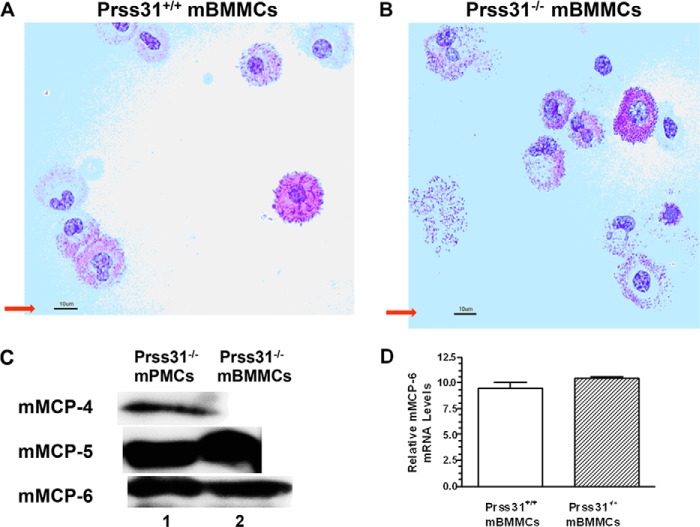FIGURE 4.
Histochemistry of WT and Prss31-null mBMMCs and protease expression in mBMMCs and peritoneal MCs. A and B, bone marrow cells harvested from WT (A) and Prss31-null (B) B6 mice were cultured for >4 weeks in the presence of IL-3-enriched WEHI-3 cell conditioned medium. As found in earlier studies (25), the resulting mBMMCs generated from WT B6 mice varied considerably in their degree of granule maturation (A). Nevertheless, because similar numbers of histochemically identical mBMMCs were generated from Prss31-null B6 mice (B), there was no defect in the IL-3/IL3Rα signaling pathways in MCs developed from Prss31-null mice. For size comparison, the red arrow pointing to the 10-μm magnification bar is shown in each panel. C, levels of mMCP-4, mMCP-5, and mMCP-6 protein in lysates of in vivo-differentiated Prss31-null mouse peritoneal MCs (mPMCs) and in vitro-differentiated Prss31-null mBMMCs were determined by SDS-PAGE immunoblot analyses. Lysates of the two populations of MCs were subjected to SDS-PAGE, and the resulting protein blots were stained with affinity-purified anti-peptide antibodies that recognize mMCP-4, mMCP-5, and mMCP-6. As found previously for WT B6 mice (1, 41) and in agreement with the histochemistry and CEA enzyme cytochemistry, mouse peritoneal MCs isolated from Prss31-null mice (lane 1) stored substantial amounts of all three serine proteases in their secretory granules, whereas the levels of mMCP-4 protein were below detection in IL-3-developed mBMMCs (lane 2). D, because the mMCP-6 gene resides immediately upstream of the Prss31 gene (Fig. 1), the level of the mMCP-6 transcript was quantitated in WT and Prss31-null B6 mBMMCs. Shown are the relative Ct expression levels of the mMCP-6 transcript normalized to that of the GAPDH transcript (mean ± ½ range, n = 2). Similar RNA data were obtained in a second experiment also carried out using mBMMCs obtained from two WT B6 mice and two Prss31-null mice. In agreement with the SDS-PAGE immunoblot data (C), targeted inactivation of the Prss31 gene using our Cre/loxP homologous recombination approach did not adversely affect transcription of the nearby mMCP-6 gene in IL-3-developed mBMMCs.

